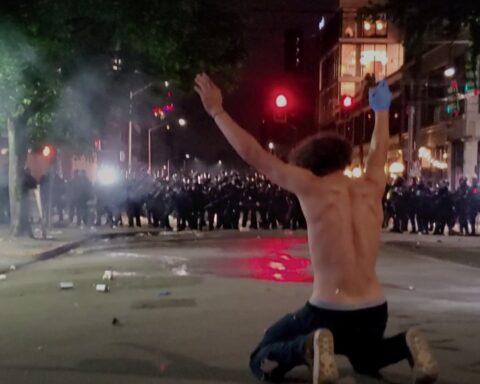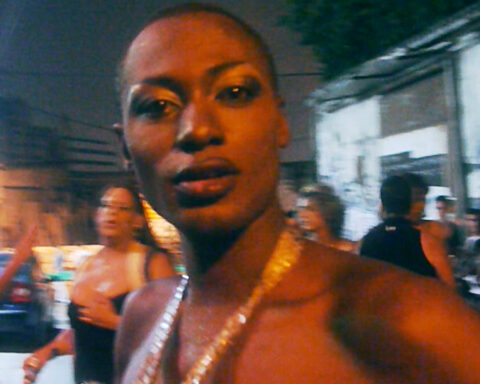The Ride Ahead
(USA, 97 min.)
Dir. Samuel Habib, Dan Habib
Programme: Special Presentations (World Premiere)
Many documentaries have centred on disabled people, but they are almost always told by able-bodied filmmakers using inherently ableist tools. It is only recently that the industry has begun opening its doors to proper disability cinema so that filmmakers can tell their own stories through their own lens. On one end, you have films like Jason DaSilva’s When I Walk (Hot Docs 2013), in which DaSilva documents his own experience adapting to a diagnosis of multiple sclerosis. It’s a powerful story, but still told with an able-bodied pretence. All the way on the other end sits Reid Davenport’s I Didn’t See You There (Hot Docs 2021), a landmark piece of disability storytelling that dared to tell the story of a wheelchair user by putting the camera at his eye-level. It challenged ableist form by putting its lens directly through a disabled perspective as poetically as it did unflinchingly, but it may not capture audience members looking for a more straightforward narrative.
Sitting somewhere in the middle is The Ride Ahead, the latest film from father-and-son duo Samuel and Dan Habib and a feature-length expansion of their short My Disability Roadmap (Hot Docs 2022). That prior film followed Samuel’s journey entering adulthood with GNAO1 Neurodevelopmental Disorder, a rare disability that decreases muscle tone in the body, causes seizures, and delays his speech. Samuel wants to move out of his parents’ home, meet a nice girl, and maybe settle down – the aspirations of any young person eager to grow up. However, using a motorised wheelchair for daily movement and an electronic device to speak with others, Samuel is unsure what his future looks like in a world that doesn’t feel designed for him. So, for advice, he speaks to a variety of disabled artists and activists while simultaneously taking the first steps to a successful, independent adult life.
Employing both conventional documentary techniques as well as technology that captures Samuel’s perspective, The Ride Ahead feels like a cautious but affirming advancement in disability cinema. The film features familiar tropes, like talking head interviews and animated cutaways, as well as inverted ones, such as Samuel’s vérité – captured by two GoPros mounted on his wheelchair – and narration, spoken through his robotic but invaluable electronic communication device, which is usually programmed by Dan. These are techniques carried over from My Disability Roadmap, but the short’s breezy pacing left little time to process these formal choices as tools for Samuel to tell his story. The Ride Ahead puts this within the text of the film and, by doing so, witnesses the emergence of Samuel as a filmmaker on his own terms. Samuel’s narration is especially exciting, as it allows Samuel’s comic sensibility to shine through. Several of the jokes here are top notch, coloured with a self-awareness that is cheeky but far from brash.
The film includes vérité captured by Dan and other able-bodied camera operators, an inescapable reality of making a broadly accessible film about disability. However, the film’s most powerful moments leave the audience firmly planted in Samuel’s wheelchair through the GoPro footage. One brief segue sees Samuel riding through a nearby forest in solitude, a rare moment where he is alone without any family or medical aids. It’s naturalistic and moving, if fleeting. Another memorable moment is when a woman, entirely off-screen, speaks to Samuel in a well-intentioned but patronising manner. Dan, also off-screen, explains to the woman what she is effectively doing, all while the film stays locked in a long take of Samuel shutting down. He gets visibly upset, although it is not portrayed as undignified; it all comes from a longing to be treated with respect. These are moments that fully realise the formal freedom of disability cinema.
Outside of that, the rest of the film boils down to a fairly standard, if charming, documentary that subverts the trauma porn of most disabled narratives but leaves little to ponder. Though its cast of mentors is engaging, from policy game-changer and Crip Camp subject Judy Heumann (to whom the film is dedicated) to artists like comedian Maysoon Zayid and Broadway star Ali Stroker, little of their screentime is used effectively enough to memorably inform the film’s major takeaways about coming-of-age. The film comes the closest when speaking directly about relationships and sex, effectively new ground for the medium, but even then it keeps things PG (Acsexybility, this is not). The film’s structure overall is a bit touch-and-go: It covers a lot of ground in terms of adulting but only the bare minimum of what it needs to convey before hopping to the next point.
All of these criticisms are merely to say that The Ride Ahead is an effective entry point for disability cinema with glimmers of provocative filmmaking. However, much like how this film is about Samuel’s own evolution as a person, so too does this film represent a stepping stone for his evolution as a filmmaker. It began with merely Dan directing (2007’s Including Samuel), and now Samuel co-directing. With time (as well as further advances in technology) Dan and Samuel Habib will get more opportunities to carve out a formal sensibility for what disability cinema looks like from Samuel’s perspective, to the point that maybe Samuel will direct a film on his own. Whatever path they take, it will be exciting to see it take shape.












